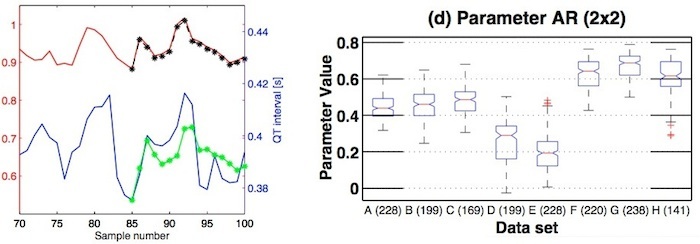The use of autoregressive (AR) models provides a new method for analyzing electrocardiographic (ECG) and blood pressure (BP) data. Multivariate AR models have been widely studied in context of economics and pattern recognition. They form a powerful tool to gain information about the dynamics of an underlying system by incorporating various input data. Although exemplified on myocarditis patients in this thesis, the general procedure is adaptable for a variety of heart related diagnostics. Certain physiological parameters are supposed to show a behavior which can be described by the coecients of an autoregressive model. Changes in these coecients might indicate alterations of the underlying system itself and thus provide an insight to processes inside the body. Considering heart related parameters, this can be a valuable tool for diagnosis and treatment of myocardial diseases.
As a frequent and potentially lethal inflammation of the heart muscle, myocarditis is of special interest for the medical community. It can be caused by bacteria, viruses or toxicants. Although it might resolve itself without complications, it can cause severe arrhythmia or heart failure. Unfortunately, a variety of symptoms in the clinical manifestation makes diagnosis complicated and an invasive biopsy still is the gold standard. Due to potential complications using this method, there is need for noninvasive methods to support diagnosis. The use of AR models for this purpose motivates this research project.
The AR models are applied to analyze the ECG and BP of myocarditis patients, which can be gained by noninvasive measurement techniques. RR and QT intervals are extracted from the ECG and used as time series for AR model parameter estimation. In order to assess the benet of incorporating additional data into multivariate AR models, certain time domain parameters from the BP are taken into consideration as well. The multivariate AR models are formulated based on the underlying physiological processes and empirical relationships. Articial time series are simulated in order to verify models and estimation algorithms. The quality of model parameter estimation is assessed with respect to the influence of noise and necessary input data length.
Using these models, data from a patient that was healed from acute myocarditis is analyzed. The parameter estimation is performed on clearly specied frames of this clinical
data. Statistical evaluation is assessed as a possibility to analyze complete datasets. It is evaluated if a change in parameters during hospitalization is present for the myocarditis patient and whether it is suitable to classify unknown data. As a second application, the use of AR model estimation for diagnosis purposes is evaluated. Therefore the data of approximately 100 subjects is used to train a corresponding classier. Cross-validation is used for performance evaluation in both cases.


